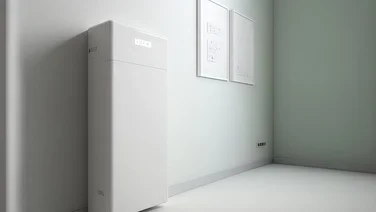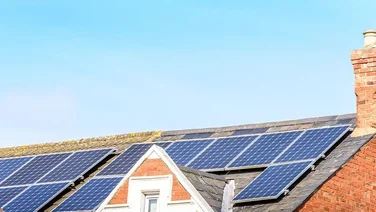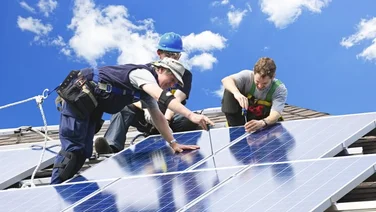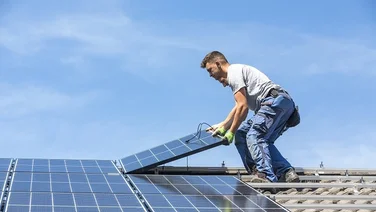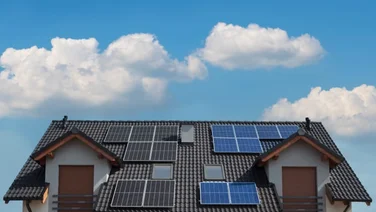We receive a small fee from trusted installers when you request a quote through our site. This helps us keep our content independent, well-researched and up to date – Learn more
- Solar panels have cost around £6,333 on average in 2025 so far
- Solar panels save the average home around 1 tonne of CO2 per year
- Sixty-five per-cent are likely or very likely to buy or rent a property with solar panels

Solar panels can increase your property’s value, if you choose to sell it on, so buying a house with solar panels already installed can be a good investment.
But when it comes to buying a house with solar panels, it can be quite daunting, but we’ve got you covered. Here are the best tips for buying – and selling – a property with solar panels, and how to deal with any issues you might encounter.
Solar energy is the cheapest, cleanest, and most efficient energy source around, and with government grants for solar panels available, benefitting from it has never been easier.
If you’re unsure about the benefits of solar panels, think of Shirley Paterson, a homeowner in Fife, Scotland. She installed solar panels over a decade ago and powers her home and electric vehicle home chargers using 95% of her solar energy. Just 5% is sold back to the National Grid.
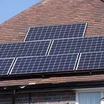
Install solar panels
Use the button below to hear from our trusted solar panel installers for a free, no obligation quote.
Should I buy a house with solar panels already installed?
Absolutely. In almost all cases, buying a house with solar panels already installed makes total financial and environmental sense, especially as the cost of solar panels continues to decline.
In fact, according to the latest data from the MCS Dashboard, solar panel installations have cost around £6,333 on average in 2025. This figure will fluctuate and change month-to-month. For example, in April, the average cost of MCS-certified solar panel installations was around £8,500. Still, this is quite a decline from 2024’s peak of more than £8,900 and a bigger drop since 2023’s pricing of more than £10,000.
If you’re worried about how solar panels will look on your home, remember that 65% are likely or very likely to buy or rent a property with solar panels, according to our 2024 National Home Energy Survey.
There’s also the environmental benefits to consider. Solar panels save the average home around 1 tonne of CO2 per year, 15% of your annual carbon footprint.
If this isn’t enough, there’s also the financial benefits to consider, which we’ll go into more detail below.
Will you save and make money?
Solar panels have the following financial benefits:
- Solar panels provide free energy year round, saving the average three-bedroom household £4,335 after 25 years
- Usually, it takes an average of 15.66 years to break even on solar panels – but if they’re already installed, you’ll have saved the installation and upfront costs. This makes solar panels even more worth having in the UK.
- You’ll only use about half the electricity you’d otherwise use from the National Grid and you’ll receive money from the Smart Export Guarantee (SEG). This means each year, you’ll have up to £200 extra in your bank account.
- If your new home had its solar panels installed while the government’s Feed-in Tariff was active, you’ll need to consider if you should continue these payments or switch to the SEG.
Solar panels also need very little maintenance, meaning you won’t need to shell out too much once you’ve moved in. All you need to do is make sure nearby trees aren’t covering them and get a list of maintenance checks from the installer.
These tasks will need carrying out every so often, but the main task is to check the inverter is working and not indicating a fault. Inverters will fail eventually and will need replacing.
Yes, in almost all cases, any feed-in tariff agreements should transfer to the new owner, and likewise, it should be simple to take on a Smart Export Guarantee contract signed by the previous owner.
Once the process is completed, the maintenance costs will transfer to you or the new owner – but that’s the same with any part of your new home.
What if I buy a house with leased solar panels?
Buying a house in this situation can be trickier as some mortgage lenders will reject your application if part of the property is owned by a company – and you can’t buy the house without the panels.
You shouldn’t have any problems if:
- The installation company is accredited by the MCS
- The installation itself was approved and is insured
- You can remove the panels without incurring penalties for missed Feed-in Tariff payments
Your solicitor will go through the lease details and contact the installation company to see whether they’ve signed the panels over to an agent.
If they have, the agent may charge a fee when the property is sold. Who pays that fee is up to you to decide with the seller.
Your solicitor will also check whether the house’s owner needs permission from the installation company to extend the property, or even sell it. There’s no reason why the installation company wouldn’t agree to a request to sell the house – but if the company has ceased to exist, it can be difficult to find the current owner.
In all cases, listen to your solicitor’s legal advice.
You won’t have to worry if the solar panels have been purchased through the Solar Together initiative, which is a group-buying scheme and the house will fully own the solar panel system.

What questions should you ask before committing to the house purchase?
Get some answers to the following questions before you commit to your new home’s solar array. You should have all the information about any potential inconveniences before you start using the panels.
The list of questions are:
- Does the house come with a solar battery? – Solar batteries can store the energy your panels produce, meaning zero waste. Solar batteries cost £2,000-£8,000, so it’s quite the saving if the house already has one.
- Are the solar panels securely fitted and effectively connected? – If you pay someone to ensure your panels are safe, it’ll eat into your solar profits. Also, if the panels aren’t connected properly, you won’t receive as much as you should and neither will the company you’re selling extra power to for SEG payments.
- What are the installation details? – Ask when the panels were installed to get an idea of how effective they’ll be at providing you with clean, free energy and their remaining lifespan. Remember to ask which company installed the panels and ask for the contract, too.
- When does the warranty expire? – Generally, a solar panel warranty is 25 years and you’ll continue to receive energy until then, but keep its expiration date in mind. The European Union guidelines are still in place, too, if they need removing and manufacturers and importers are legally required to dispose of them.
Summary
- In almost all cases, it makes total financial and environmental sense, especially as the cost of solar panels continues to decline.
- According to the latest data from the MCS Dashboard, solar panel installations have cost around £7,500 on average in 2025. This figure will fluctuate and change month-to-month
- Solar panels save the average home around 1 tonne of CO2 per year, 15% of your annual carbon footprint.
- You should have all the information about any potential inconveniences before you start using the panels.
- Buying a house in this situation can be trickier as some mortgage lenders will reject your application if part of the property is owned by a company – and you can’t buy the house without the panels.



